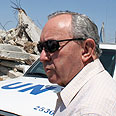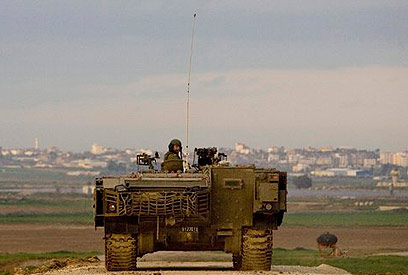
Soldiers: Goldstone damage already done
Dozens of IDF soldiers still feel scrutinized over Operation Cast Lead, blame judge's harsh report for tough investigations. Soldier: 'Damage already done'
Goldstone questioned the validity of his own findings regarding Operation Cast Lead in a Washington Post op-ed published on Friday, sparking a heated debate.
A soldier questioned by the Military Police after the operation told Ynet that "the Goldstone Report gave a really strong push to all of this. As far as I'm concerned, him changing his stance does nothing, the damage has already been done."
Dozens of interrogations into the Gaza Strip operation were conducted by the Military Police in the past couple of years. Hundreds of soldiers were subpoenaed to give their testimonies, dozens questioned under advisements. Despite the fact that only three indictments were filed for incidents having to do with the military operation, the feeling among those 'suspected' was harsh.
The Military Advocate General explained that each case was examined individually, however the soldiers are convinced the 'Goldstone atmosphere' contributed to the issue.
"The period following Operation Cast Lead was one of the hardest of my service. Suddenly you're a suspect, they treat you very unkindly. It's absurd that on the one hand we were over there, fighting to return the peace to the south, and on the other hand they make us into some kind of criminals," a soldier who served in the Armored Corps told Ynet.
He was questioned by the Military Police in regards to an incident in which civilians were unintentionally injured by fire coming from an IDF tank. The case was eventually closed and none of the soldiers questioned was put on trial.

"One day I get a phone call telling me I'm subpoenaed for questioning," said a former paratrooper officer. "At first I had know idea what it was about, and when I got there they talked to me about an incident that occurred during the operation. We shot towards a suspected Palestinian – a completely routine procedure. He was a suspected terrorist and we acted according to the suspect detaining protocol."
The officer, who was questioned numerous times, said he felt humiliated. "I've never been inside an interrogation room, it felt disgusting," he said.
Investigators remember Goldstone
Aside from personal feelings, the investigations often prevented the officer and his colleagues from being promoted, or affected their decision of whether or not to stay in the army.
Soldiers who spent time in the investigation rooms, as well as those who were summoned to testify, and claim that not once were they asked to indicate their friends, said that Goldstone's name came up many times by investigators.
"The moment there is an interrogation going on no one is there to support you, even the commanders, who are supportive of you, are afraid to speak," said the former Armored Corps soldier.
He added that some of those interrogated were forced "to pay huge amounts of money to lawyers and lived in uncertainly for months. Investigations should be made, but there was an atmosphere here without a doubt, there was pressure, even for the investigators, you could feel it."
The soldiers who were taken to investigation rooms, even if just to give their testimony, are convinced that if not for the Goldstone Report being written the way it was, there were far fewer inquiries.
"There are always inadequacies and not such great events, but that's why there is an investigation of the operation," admitted the former paratrooper officer. "There was no operation with a more legitimate basis than this one, and you could understand, even just by conversations between commanders, that the soldiers clearly understand who was to be targeted and who wasn't. If a civilian was injured you should check with Hamas why they used him inside a booby-trapped building. Even an army that wants to be exonerated and appear proper as one who can examine itself – must set limits."
- Follow Ynetnews on Facebook










